This Week's Script Cavalcade: The Last Detail
While thinking about Veteran’s Day and stories about military life, I want to use this week’s Script Cavalcade to talk about one of my favorite, distinctly character-driven screenplays. Adapted by Robert Towne from a novel by Darryl Ponicsan, The Last Detail tells the story of two Navy lifers assigned to transport a cherubic younger shipman from a base in Norfolk, Virginia to a prison in Portsmouth, New Hampshire. The younger sailor, Larry Meadows, has been sentenced to eight years in the brig for the crime of attempting to steal forty dollars from a commanding officer’s wife’s charity box. The two petty officers, Buddusky and Mulhall, have a simple initial plan—get the kid to the pen in two days, then spend the rest of the week having fun with their per diem.
Their plans change slightly when something unexpected happens. Buddusky and Mulhall start to feel for and take a liking to their prisoner, making a point to use their limited time to help him experience everything he’ll miss out on while locked up. This road movie offers insight into America’s state of mind during the 1960s and '70s. As the story progresses, Mulhall and Buddusky grow a conscience, slowly recognizing the absurdity of an eight-year prison sentence for such a meager crime. Still, they scrappily carry out their orders. In its own quiet and personal way, the script seems to reflect the country’s feelings of helplessness around events like Watergate and Vietnam—all of it giving way to the notion that maybe we’re all longing to escape and find freedom from the day-to-day prisons of our own making. These are big ideas and questions for a movie about three sailors shooting the breeze and going on small detours as they hop buses and trains through the Mid-Atlantic.
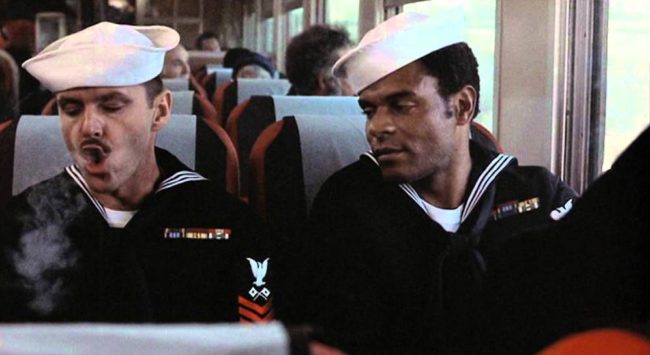
Robert Towne, perhaps best known for writing Chinatown, here delivers another tour-de-force script, but in this adaptation the dramatic punches are delivered through the subtle uncovering of the characters’ pain and humanity.
In this blogger’s opinion, the script for The Last Detail is just as essential a work to study as Chinatown. The screenplay offers pointed instruction on how to reveal character on the page in a way that elicits curiosity and empathy; it offers insight into how to craft sharp and meaningful character interactions and, perhaps most importantly, how to build a compelling character arc in an everyday, real-world kind of story.
The plot isn’t hinged on slaying a dragon or stopping a madman from causing destruction. There’s no major secret to uncover—no nefarious business man who impregnated his daughter—just a kid to drop off who’s awaiting punishment for a petty crime.
As the prison-type destination looms closer, questions arise. Will Buddusky and Mulhall get Meadows to Portsmouth on time, or will they somehow screw it up? Or will they choose to abandon their detail and let him go free? These questions give rise to drama and keep us engaged in the story. Every element of the script is made just a bit more poignant with the knowledge that these are Meadows' last few days as a free man for a long time. It makes the other two sailors internally question the last time they were truly free.
As the sailors continue along down the road, sucking the nectar from the week, they get to know each other. This is the beauty of putting three disparate characters on a journey together. The script sets Buddusky and Mulhall up as chasers and mean bastards, getting us to make assumptions about them by giving them nicknames—Badass and Mule— assumptions that will be satisfyingly shattered by the script’s conclusion.
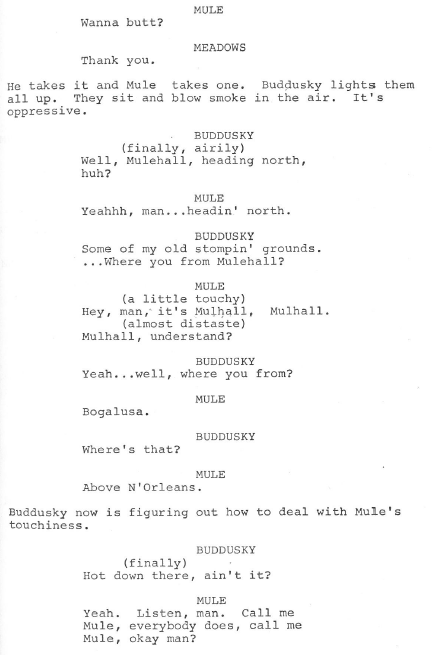
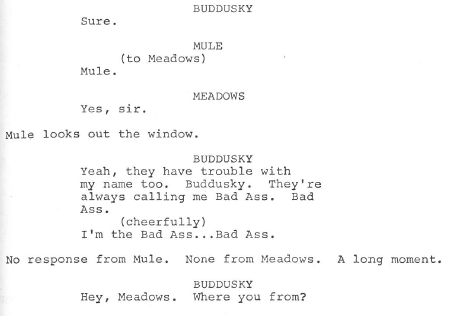
The script also makes it a point to set Meadows up as a criminal, but then shows us that he’s merely a naïve kid, who probably doesn’t deserve such a harsh sentence for a minor offense. These are good lessons in how to use names, hearsay from other characters and even uniforms to build up a persona and gradually chip away at it until we see the truth that’s underneath. And honestly, what’s more compelling than that when reading a script or watching a film?
Towne ensures that his scenes pop by giving his sailors contrasting personalities and different ways of handling situations. In navigating to Portsmouth, Buddusky is a troublemaker and button-pusher, giving Mulhall the task of constantly having to play defense and rein him in. Similarly, Buddusky is always trying to provoke and entertain the shy and contained Meadows. Automatically, the scenes are bubbling with playable conflict that deftly and discreetly moves the story forward while also giving the actors much to sink their teeth into. It’s very interesting to chart Meadows character arc from frightened kid to attempting to be more belligerent and manly like Buddusky.
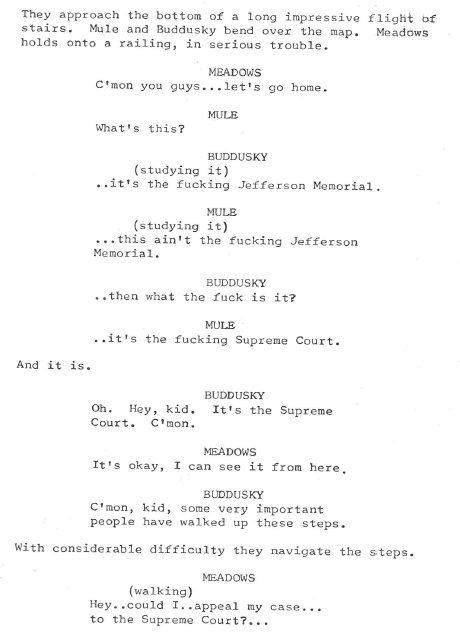
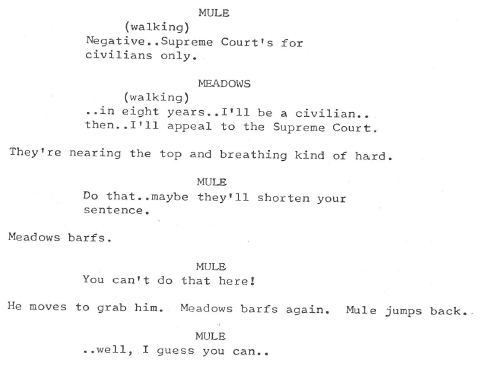
Notice that no expletive goes unspoken. Towne makes sure these sailors talk like sailors, citing in Easy Riders, Raging Bulls by Peter Biskind that people resort to cursing when they feel powerless.
Most screenwriting wisdom compels us to create heroes and heroines who stand up for what they believe in no matter how gut-wrenching the personal cost to them. Perhaps one of the biggest lessons from The Last Detail is that it can be just as wrenching a dramatic choice to have a character know or feel they ought to stand up or do something, but then not do it, perhaps choosing their professional, personal or societal obligations over what their heart or conscience tells them is right. If we're being honest, that's the choice most of us would probably make anyway.
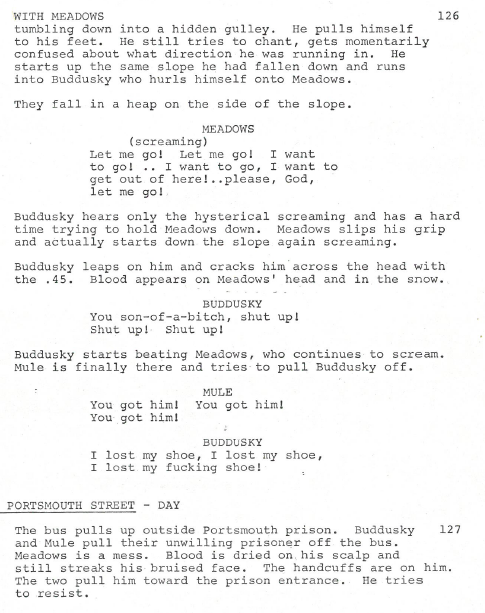
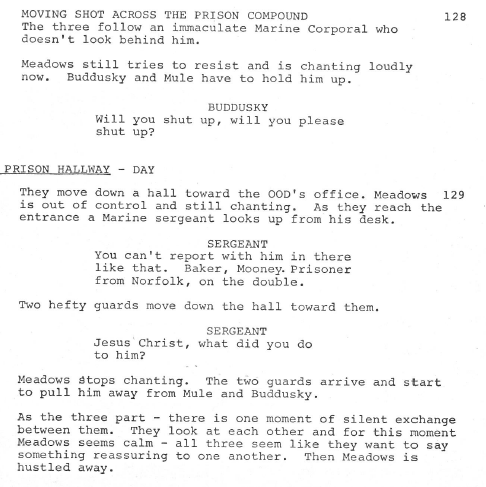
What we're left with, then, like Buddusky and Mulhall, is an aching sense of regret, a sensation familiar to anybody who's ever lived a life.
Why write or make a movie if not to elicit such a universal feeling?
If you want to learn more about Robert Towne, watch our Writer Speaks Oral History interview with him here. It's also currently playing on the monitors outside the library.
Find out more about the Writer's Guild Foundations Veterans Writing Project and how you can support it right here.
If it's military stories you're interested in, check out the WGF Library catalog. We have everything from Platoon to Hacksaw Ridge to scripts from CBS's recent hit Seal Team.
